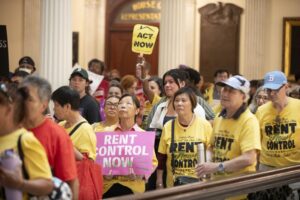
Tenant advocates gather near the House of Representatives chamber on July 29, 2025, ahead of a legislative hearing where they pushed to lift the statewide ban on rent control. Photo by Chris Lisinski | State House News Service
Two ballot questions that could have big impacts on Massachusetts real estate vaulted their first hurdle to making it into the 2026 state election.
Attorney General Andrea Campbell certified a record 40 proposed laws and constitutional amendments as legal to pitch via the statewide ballot. Her move doesn’t reflect her personal policy positions or other endorsements, merely whether the questions meet the state’s constitutional requirements for ballot questions.
Among them: a ballot question that would set up a harsh rent control regime statewide, and a second ballot question that’s billed as legalizing starter homes by capping minimum lot sizes at 5,000 square feet for a single-family home in a residential area.
The former is being pushed by the Homes for All Coalition, a group of tenant advocates. The latter is the brainchild of local housing researcher Andrew Mikula, with support from a number of prominent zoning reform advocates and housing scholars acting in a personal capacity.
Real estate trade groups are particularly nervous about the rent control ballot question, with some declaring the need for an “all hands on deck” response to beat back what could prove to be a popular idea with the general public.
“Rent control is a flawed, harmful policy that stunts housing creation and increases overall housing costs: A horrifying thought given the hundreds of thousands of units our state must build to overcome the housing crisis,” Greater Boston Real Estate Board CEO Greg Vasil said in a statement. “Our state’s focus needs to be on reducing barriers to housing creation so we can develop more homes across all price points, whether it be for young families looking to purchase their first home, or retirees looking to downsize in the community they have known for decades. While we respect the Attorney General’s decision on the legality of this question, the real estate industry will fight the proposed initiative every step of the way.”
What Rent Control Proposal Seeks
The rent control ballot question would cap annual rent increases for apartments at the annual increase in the Consumer Price Index or 5 percent, whichever is lower. For example, the Boston-area Consumer Price Index rose 3.2 percent for the 12-month period ending July 31, according to Bureau of Labor Statistics data.
The proposal would exempt owner-occupied buildings with four units or less, public housing units, short-term rentals, nonprofit-owned apartments, student and religious housing, and units younger than 10 years old.
The proposal would set Jan. 31, 2026 as the baseline for calculating rent increases, or the last rent charged if the unit is vacant at that time.
Enforcement could be carried out by any Massachusetts resident by filing a lawsuit under the state’s Chapter 93A consumer protection laws.
Rent control was banned statewide by ballot question in 1994, and scholars and real estate groups say if passed the law would likely result in most apartment owners being reluctant to spend any significant amount of money on upkeep. And despite the exemption for new construction, real estate groups have warned in the past that such a law could scare away out-of-state developers and investors for many years.
Proponents say the measure is necessary to protect tenants from sudden rent hikes and displacement that can occur in rapidly changing neighborhoods.
Supporters Face Big Hurdle
But while recent polling suggests the concept of rent control is generally popular among Massachusetts voters, the Homes for All Coalition faces two big hurdles to actually get their proposal on the 2026 ballot.
First, the group must collect 74,574 valid signatures from registered voters over the next three months. If the Legislature doesn’t vote to put their measure on the ballot before May 6, 2026, Homes for All must scrounge up an additional 12,429 by July 1, 2026 to stay on the ballot.
State legislators have historically been hostile to rent control proposals.
“I can’t wait to start collecting signatures from my neighbors to put rent stabilization on the ballot,” Betty Lewis, a Mattapan tenant, said in a statement supplied by Homes for All Massachusetts. “All across Massachusetts, high rents are displacing people from our communities, or making them work multiple jobs just to pay the rent. When rent can go up by hundreds of dollars overnight, seniors are forced to put off their retirement, and young people and families can’t save money for the dream of owning a home. My neighbors and I need stable rents so we can all keep calling Massachusetts home!”





